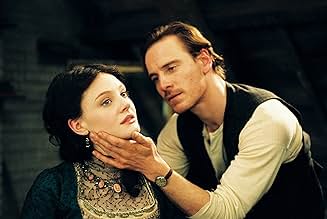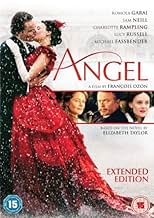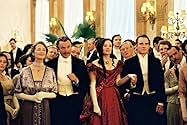Angel
- 2007
- Tous publics
- 2h 14m
IMDb RATING
5.8/10
5.7K
YOUR RATING
The rise and fall of a young eccentric British writer, in the early 20th century.The rise and fall of a young eccentric British writer, in the early 20th century.The rise and fall of a young eccentric British writer, in the early 20th century.
- Awards
- 1 win & 3 nominations total
Geoffrey Streatfeild
- Sebastian
- (as Geoffrey Streatfield)
Featured reviews
What a disappointment. It's hard to know what attracted Ozon to Elizabeth Taylor's fantastic source novel as his adaptation is misjudged on a number of levels. Although he slavishly sticks to Taylor's plot, Ozon has real problems with - or chooses to ignore - the very things that are at the heart of the novel. Taylor's ironic, often cruel wit is missing. Characters are softened in the way one would expect of Hollywood, but not of French cinema. He doesn't seem able to master Taylor's irony at all - the audience at last night's London Film Festival screening were very confused about where and when they should laugh. It was impossible to know what the director felt about the characters. Almost entirely missing was Taylor's exceptional portrait of class - one of the major themes of the novel. The film felt like a classic Europudding - rootless in an implausible world. There was very little sense of being in Edwardian Britain.
The film is overwrought and out of control. If I hadn't already read the novel, I would have been completely puzzled by what I was watching and how I was supposed to respond or feel.
The film is overwrought and out of control. If I hadn't already read the novel, I would have been completely puzzled by what I was watching and how I was supposed to respond or feel.
It starts quite strangely for a movie about the life of a romantic novel writer in the early XX century Britain, with a wannabe Danny Elfman's music, an ugly pink opening, and an actress obviously too old for the part she plays. But, as the movie goes on, if the strangeness still remains, all this elements begin to make sense and create and original, and I think, never experimented on screen, world. ANGEL is indeed a really good surprise if you manage to accept and enter the inner world that the movie describes, and the kitsch atmosphere of Ozon's style (witch was for me unbearable in his previous movies, like "8 Femmes", but that absolutely fits the subject of this movie). When I learned that Ozon directed a movie in English about a young artist, I was waiting for a sort of kitsch version of ESTER KAHN (the wonderful movie another French director Arnaud Despechin made about a young lady in Britain in the early XX century), but I couldn't be more wrong : ANGEL is a sort of feminine (or Gay) version of Tim Burton's ED WOOD, describing how a strong imagination no matter how bad it is can completely recreates the world, and how you can fully lives in a fantasy universe, when you believe hard enough in your talent and your art .
The movie tells us the life of Angel (Ramola Garai, who has everything to become the new Ludivine Sagner for François Ozon), from her childhood, where she dreams, upstairs the family's grocery, of the fastidious and glamorous life of a famous writer, to her success in the house of her dreams : Paradise house, where she has everything she ever dreamed of when she was young. The originality of this movie is that everything is seen with Angel's eyes. And her eyes only see what her imagination tells them to see, for she doesn't live in reality, but always fills it with dreams, so that she can live as if she were one of her romantic heroine. Whatever awful and sad the word might be, it never touches Angel, for she always transforms it with her imagination the way she wants. And imagination, she has plenty... Of course, her world is a childish, puerile and kitsch world of a bad Barbara Cartland 's novel and the movie completely recreates it on screen, with all the artifices it supposes : from the colors that explains the pink to the situations : when she proposes Esme, the man she chooses to love, the rain suddenly stops when he says yes, and a rainbow appears : empirical reality doesn't exist here, for Angel is unable to see it. But, and here's the all interest of the movie, the spectator, on the other hand, is absolutely able to watch it.
This tension between the strong believing that Angel puts in her world, and the ridiculous that the spectator sometimes sees in it, is mostly tangible thought other character's eyes (like Charlotte Ramplin is the more judgmental, she's the first to condemn Angel's books, but mostly for personal reasons : she can't stand the pretentious and rude young lady with whom her husband is falling in love, or Esme, the untalented painter, who is also one of this ambiguous character, for he accepts his wife universe, but is unable to really find his place in this fictive world). And the movie constantly plays with this two degrees, witch brings humanity, cruelties and sadness to the shinny but unreal world it describes. That's also why this movie is so surprising : we never know exactly where we are : is this a dream, when will it stops, will reality goes after it in the end ? This constant instability regenerates the spectator interest for this movie, and keep it far from the classical costumed movie about the rise and fall of an English women writer it could have been.
That's also why this movie reminds me of Tim Burton's ED WOOD, for, beyond their differences, they both deal with the same thematic of the triumph of an artistic imagination over the world, and the fall that fallows this triumph, and they also share a melancholic tone, as well as real understanding and compassion for untalented but passionate artists.
The movie tells us the life of Angel (Ramola Garai, who has everything to become the new Ludivine Sagner for François Ozon), from her childhood, where she dreams, upstairs the family's grocery, of the fastidious and glamorous life of a famous writer, to her success in the house of her dreams : Paradise house, where she has everything she ever dreamed of when she was young. The originality of this movie is that everything is seen with Angel's eyes. And her eyes only see what her imagination tells them to see, for she doesn't live in reality, but always fills it with dreams, so that she can live as if she were one of her romantic heroine. Whatever awful and sad the word might be, it never touches Angel, for she always transforms it with her imagination the way she wants. And imagination, she has plenty... Of course, her world is a childish, puerile and kitsch world of a bad Barbara Cartland 's novel and the movie completely recreates it on screen, with all the artifices it supposes : from the colors that explains the pink to the situations : when she proposes Esme, the man she chooses to love, the rain suddenly stops when he says yes, and a rainbow appears : empirical reality doesn't exist here, for Angel is unable to see it. But, and here's the all interest of the movie, the spectator, on the other hand, is absolutely able to watch it.
This tension between the strong believing that Angel puts in her world, and the ridiculous that the spectator sometimes sees in it, is mostly tangible thought other character's eyes (like Charlotte Ramplin is the more judgmental, she's the first to condemn Angel's books, but mostly for personal reasons : she can't stand the pretentious and rude young lady with whom her husband is falling in love, or Esme, the untalented painter, who is also one of this ambiguous character, for he accepts his wife universe, but is unable to really find his place in this fictive world). And the movie constantly plays with this two degrees, witch brings humanity, cruelties and sadness to the shinny but unreal world it describes. That's also why this movie is so surprising : we never know exactly where we are : is this a dream, when will it stops, will reality goes after it in the end ? This constant instability regenerates the spectator interest for this movie, and keep it far from the classical costumed movie about the rise and fall of an English women writer it could have been.
That's also why this movie reminds me of Tim Burton's ED WOOD, for, beyond their differences, they both deal with the same thematic of the triumph of an artistic imagination over the world, and the fall that fallows this triumph, and they also share a melancholic tone, as well as real understanding and compassion for untalented but passionate artists.
I'm a great admirer of Francois Ozon's French movies (Swimming Pool, Under the Sand, 8 Women) but this, his first foray into English language drama, is a stinker. Adapted from a book by Elizabeth Taylor about an Edwardian novelist whose life fails to live up to her romantic fantasies it is as ridiculous, clichéd and overwritten as any of the heroine's creations; hard to know if this is the fault of the source material or Ozon's adaptation (though he has been assisted by acclaimed playwright and translator Martin Crimp). You watch it in disbelief, unsure if you're meant to laugh or not, faintly hoping that this is a deliberate attempt at post-modern ironic detachment (but wondering what would be the point) and gradually realising that Ozon thinks he is Douglas Sirk and has completely embarrassed himself.
The actors look all at sea, particularly Romola Garai who can't give any charm to the unlikeable heroine, and Ozon adopts a stiff and old-fashioned style of film-making - complete with syrupy music and terrible back projections - which make the film look as it it was made in 1936 rather than 2006; I'd like to think this was a deliberate if unfortunate miscalculation but the consequence is that the finished product looks stilted and amateurish. Only Charlotte Rampling - Ozon's muse - almost saves the day, but her air of sardonic detachment probably says more about her feelings towards the film than about her character.
The actors look all at sea, particularly Romola Garai who can't give any charm to the unlikeable heroine, and Ozon adopts a stiff and old-fashioned style of film-making - complete with syrupy music and terrible back projections - which make the film look as it it was made in 1936 rather than 2006; I'd like to think this was a deliberate if unfortunate miscalculation but the consequence is that the finished product looks stilted and amateurish. Only Charlotte Rampling - Ozon's muse - almost saves the day, but her air of sardonic detachment probably says more about her feelings towards the film than about her character.
If I had approached this movie as a satire, perhaps it would have been more bearable. Or maybe not. It somewhat feels like a play on 40's-50's movie comedy, but set in the early 1900's. The script (and the acting for that matter) is so flawed, there is no need to even bother going over its flaws. Fassbender clearly lives in the 21st century and Romola is straight out of an overacted tragicomedy play from the 1800's, except she is behaving like a bratty teenager we see on Sweet 16. I hope she was doing it on purpose, otherwise there are no excuses for her annoyance. There is a fine line between funny and annoying. I had to force myself to finish watching this movie just because I am such a huge Fassbender fan. Him, along with Charlotte and Sam, what a waste of talent.
Angel Deverell (Romola Garai) imagines herself to be a writer. Night after night she writes of her imaginative world. At school, she is ridiculed for her fantasies, and her mother (Jacqueline Tong) has no idea of her talent. A London publisher Theo (Sam Neill), publishes her first book despite her arrogance and his reservations. The novel is a bestseller. She writes another and another and another, and so on.
At the height of her fame, she meets the painter Esmé (Michael Fassbender), and is immediately stuck, even if he is even more arrogant that she is. And, sad to say, more untalented.
This is the key to this film. It is a satire of those stories of the period. There are only two serious people in the film. The rest are caricatures of popular characters and settings.
British writer Elizabeth Taylor's novel, based upon Marie Corelli, a long-forgotten English novelist of the 19th Century, was translated to the screen by François Ozon (Swimming Pool, 8 Women), who also directed. He certainly captured the ego Corelli was reputed to have.
The life she lived or the life she dreamed? That is the question of this film. There is no doubt that for a few brief moments, Angel was never in touch with reality. It makes for great satire.
At the height of her fame, she meets the painter Esmé (Michael Fassbender), and is immediately stuck, even if he is even more arrogant that she is. And, sad to say, more untalented.
This is the key to this film. It is a satire of those stories of the period. There are only two serious people in the film. The rest are caricatures of popular characters and settings.
British writer Elizabeth Taylor's novel, based upon Marie Corelli, a long-forgotten English novelist of the 19th Century, was translated to the screen by François Ozon (Swimming Pool, 8 Women), who also directed. He certainly captured the ego Corelli was reputed to have.
The life she lived or the life she dreamed? That is the question of this film. There is no doubt that for a few brief moments, Angel was never in touch with reality. It makes for great satire.
Did you know
- TriviaThe story is inspired by the life of Marie Corelli.
- Quotes
Angel Deverell: [from trailer] Everyone told me my dreams were lies. All I wanted was to make it true.
- ConnectionsReferenced in Une nouvelle amie (2014)
- How long is Angel?Powered by Alexa
Details
- Release date
- Countries of origin
- Official sites
- Language
- Also known as
- Paradise
- Filming locations
- Production companies
- See more company credits at IMDbPro
Box office
- Budget
- €14,900,000 (estimated)
- Gross worldwide
- $2,835,903
- Runtime2 hours 14 minutes
- Color
- Sound mix
- Aspect ratio
- 1.85 : 1
Contribute to this page
Suggest an edit or add missing content



































